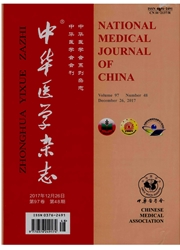

 中文摘要:
中文摘要:
目的了解军事医学科技人员应对方式与心理健康的关系。方法应用横断面调查研究,对325名从事军事医学科技工作的不同职称人员应用焦虑、抑郁自评量表、应对方式量表进行测量,进行组间对比分析。结果军事医学科技人员焦虑、抑郁分(30分±6分,37分±8分)低于全国常模(34分±6分,42分±11分)且差异有统计学意义(均P〈0.01);副主任技师抑郁分(42分±7分)高于所有其他职称,焦虑分(32分±7分)高于研究员(28分±4分)且差异均有统计学意义(P〈0.05),求助分(2.8分±0.5分)除与副研究员(2.8分±0.5分)无差异外低于所有其他职称,自责分(1.9分±0.6分)高于助理研究员(1.0分±0.6分)(P〈0.01)、研究员(1.6分±0.6分)(P〈0.05)且差异均有统计学意义;相关与回归分析结果表明,积极应对方式与抑郁(r1=-0.519)、焦虑(r3=-0.348)相关,消极应对方式与抑郁(r2=0.314)、焦虑(r4=0.407)相关且差异有统计学意义(P〈0.01)。结论应对方式对军事医学科技人员心理健康有显著影响,提高求助、减少自责和幻想能够减轻医学科技人员焦虑和抑郁。
 英文摘要:
英文摘要:
Objective To study the relationship of coping behavior and mental health of military medical researchers and technicians. Methods A cross-sectional survey was conducted, using the self-rating anxiety scale (SAS), self-rating depression scale (SDS) , and self-rating scale of coping behavior, among 325 military medical laboratory scientists and technicians with different professional titles.Results The anxiety and depression scores of the military medical researchers and technicians were 30 ± 6 and 37 ± 8 respectively, both significantly lower than those of the national norm (34±6 and 42 ± 11 respectively, both P 〈 0. 01 ). The depression score of the associate chief technicians was 42 ± 7, significantly higher than those of the medical researchers and technicians with any other professional titles ( all P 〈 0. 05 ), and the anxiety score of the associate chief technicians was 32 ± 7, significantly higher than that of the research fellows (28 ± 4, P 〈 0. 05 ). The seeking help score of the associate chief technicians was 2, 8 ± 0. 5, not significantly different from that of the associate research fellows ( 2. 8 ± 0. 5 ), but significantly lower than those of the military medical researchers and technicians with any other titles ( all P 〈0.01 ). The self-blame score of the associate chief technicians was 1.9 ± 0. 6, significantly higher than that of the assistant research fellows ( 1.0 ± 0. 6, P 〈 0. 01 ) and that of the research fellows ( 1.6 ± 0. 6, P 〈 0. 05 ). Correlation and regression analysis showed that active coping behaviors were significantly positively correlated with depression (r1 = -0. 519) and anxiety (r3 = -0. 348 ) ; and negative coping behaviors were significantly negatively correlated with depression ( r2 = 0. 314 ) and anxiety ( r4 = 0. 407 ). Conclusion Coping behavior has significant influence on the medical researchers and technician. Increasing seeking help and decreasing self-blame and imagination help release the
 同期刊论文项目
同期刊论文项目
 同项目期刊论文
同项目期刊论文
 期刊信息
期刊信息
